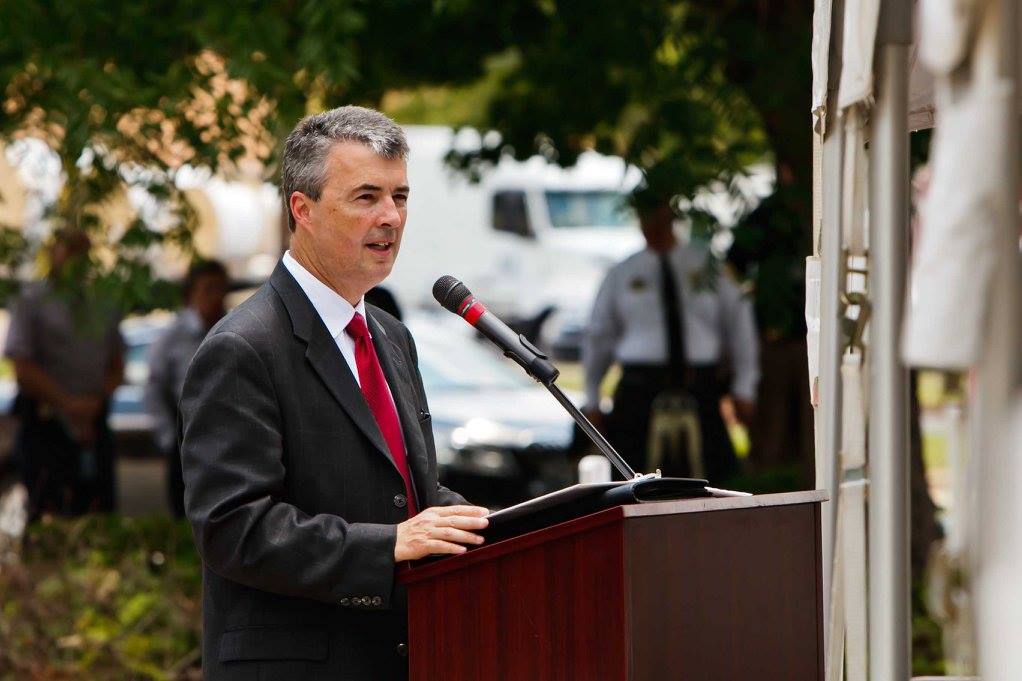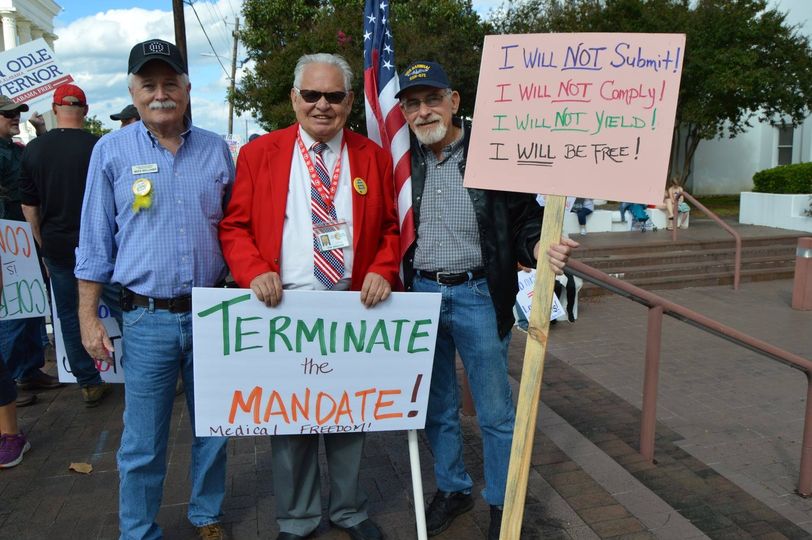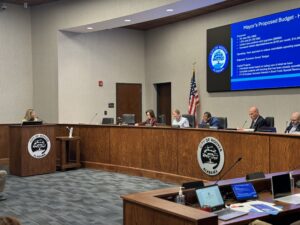Members of Congress voice concerns on impending DoD vaccine deadline

U.S. Representatives Mike Rogers and Jerry Carl joined by Rep. Rob Wittman and other colleagues in sending a letter to President Joe Biden and Secretary of Defense Lloyd Austin voicing their concerns on the impending vaccination deadlines for Department of Defense contractors. The letter points to the serious long-term costs that a vaccine mandate will have both on our defense industrial base and our overall national security. The letter stated, “Our defense industrial base is not a monolithic entity – the hardworking patriots who comprise the backbone of the industry come from diverse backgrounds. As such, though many contract workers have opted to receive vaccination, many have not, and the reasons are abundant.” The members also voiced concern about the loss of important skilled veteran workers. “Those who adamantly refuse the vaccine will accept termination. We will lose critical experience in skilled labor. We will lose opportunities for mentorship and on-the-job training from veteran craftsmen. In the long-term, we will miss quality control standards. We will face endemic cost overruns and rework as decades of lessons are not passed to the next generation.” The members also pointed to the long-term damage this will do for our ability to deter adversaries. “Perhaps most concerning to us lies in the near-term. When the deadlines and cost estimates aren’t met, who shoulders the responsibility? If a contractor loses key members of its workforce due to a post-negotiation customer demand, the customer is to blame. The Department of Defense is the customer and will ultimately be at fault when the industrial base falters at a crucial turning point in our deterrence of China.” The letter was also signed Elise Stefanik, Vicky Hartzler, Doug Lamborn, Joe Wilson, Jack Berman, Blake Moore, Scott Desjarlais, and Bill Posey.
Steve Marshall advises Alabama federal contractors not to investigate employees seeking vaccine exemption

Alabama Attorney General Steve Marshall, along with Republican state legislative leaders and the state Personnel Office, have issued an advisory regarding the COVID-19 vaccine mandate for federal contractors. The advisory urges federal contractors in the state to not investigate employees seeing a religious exemption to the COVID-19 vaccine. The letter states, “Alabama-based employers, and particularly public university employers, should liberally construe—in favor of the employee—any exemption sought by an employee for medical or religious reasons. In reviewing an employee’s request for a religious exemption, employers should not inquire into the validity of an employee’s religious beliefs, including the motives or reasons for holding the belief.” The letter was co-signed by State Personnel Department Director Jackie Graham, Mac McCutcheon, Greg Reed, Danny Garrett, Arthur Orr, Steve Clouse, and Greg Albritton. The letter comes after the University of Alabama and Auburn University said they will require all federal employess to be vaccinated by December 8. The schools issued a joint statement last week saying, “As federal contractors, and like most higher education institutions, the University of Alabama System campuses – including The University of Alabama, the University of Alabama at Birmingham, and the University of Alabama in Huntsville – and Auburn University must comply with the executive order and accompanying guidance, unless that executive order is withdrawn or modified.” “Failure to comply will place our universities in jeopardy of losing hundreds of millions of dollars received through federal contracts and awards, as well as thousands of jobs funded by those dollars.” Marshall also added that any public university employee that is denied a reasonable request for exemption should contact the Civil Division of the Attorney General’s Office. The letter explains, “No employee of a public university in Alabama, nor any employee of Alabama state government, will forfeit their livelihood as a result of the federal government’s flagrant overreach.” “The Attorney General’s Office, working with the State Personnel Department, will assist in transferring these employees into other public university/state employment,” the letter continued. Marshall also added that the Attorney General’s Office is preparent a lawsuit to fight the mandate. Marshall stated on Twitter, “Alabama-based employers should liberally construe – in favor of the employee – any exemption sought by an employee for medical or religious exemptions with regards to vaccine mandates. My office is preparing its lawsuit to challenge the federal government.”
Dan Sutter: Government jobs for all?

Modern Monetary Theory (MMT) offers some unconventional policy recommendations based on the United States’ monetary sovereignty. MMT proponents also advocate government-guaranteed jobs paying a living wage for all Americans. What would be the consequences of such a guarantee? The Public Service Employment program detailed in a 2018 paper from the Levy Economics Institute would be funded by Washington and administered by states. It would offer full and part-time jobs paying $15 per hour plus benefits. The program’s spending would be mandatory, like other entitlement programs. The jobs would “provide public services in nonprofit community organizations, public schools, and state and local governments.” The program could accomplish three distinct ends. The first is stabilizing aggregate demand during economic downturns. The second is instituting work relief in place of cash assistance. The third is implementing a “living wage” for all Americans. When the economy slips into recession, businesses lay off some workers and cut others’ wages. Reductions in these households’ spending produce second-round (and third-round) effects: landlords, for example, cut back their spending after not receiving rent. Many economists support macroeconomic stabilization. Stabilization works much better when automatic. Discretionary stabilization spending, like 2009’s American Recovery and Reinvestment Act, can take months to enact. Laid-off workers can start a guaranteed government job immediately. Today unemployed workers receive cash assistance. While I do not advocate government make-work jobs, work-relief has two advantages over cash assistance. First, work requirements effectively control fraud, as revealed by the 1990s welfare reforms. People working while on the welfare rolls never showed up for mandatory job training. Work-relief also denies recipients the leisure of staying home. People will compare the full value of their options. Suppose a person values the freedom of not working at $30,000 a year. If they also receive $10,000, only a $20 per hour job matches the full value of the cash assistance. The MMT jobs program also implements a living wage providing a “just” level of compensation. Economics shows how workers in a competitive labor market get paid the value they create for businesses. The “problem” of low wages is then inadequate job skills. The living wage is redistribution disguised as work. Market wages and salaries are not charity; the prices customers willingly pay for goods and services cover workers’ pay. Market-based salaries come entirely from voluntary payment, and workers earn their pay by helping produce goods and services. Guaranteed jobs effectively set a minimum wage because few Americans will work for businesses offering worse compensation packages (wages and benefits). Government jobs would be far more effective in assisting low-wage workers because a minimum wage ends up pricing many out of the labor market altogether. Government jobs paying $15 an hour plus benefits would likely cost $40,000 per job annually. MMT proponents project 15 million government jobs would be needed even when the economy is strong. MMT can advocate such a budget-busting program because, in its view, monetary sovereignty renders Federal spending costless under most circumstances. The biggest potential problem with the jobs guarantee, even at a lower wage, is whether people will have to work. What exactly is a government “guaranteed job”? The term job suggests a person must work satisfactorily or be fired. The guarantee suggests anyone fired must then be given another position. Government guaranteed no-show jobs would blow up the labor market. If you had a “job” paying $30,000 plus benefits not requiring work, how much would you need to be paid to take a real job? Guaranteed $15 per hour no-show jobs would effectively be a $30 or $40 per hour minimum wage. The United States is prosperous because we produce goods and services people want in large quantities. Yet production requires real work, not government make-work jobs. By diverting millions out of productive private-sector jobs, the MMT jobs guarantee seems guaranteed to impoverish America. Daniel Sutter is the Charles G. Koch Professor of Economics with the Manuel H. Johnson Center for Political Economy at Troy University and host of Econversations on TrojanVision. The opinions expressed in this column are the author’s and do not necessarily reflect the views of Troy University.
Jim Zeigler: Joe Biden may ease off vaccine mandate, but citizens should keep pressure on

The Biden administration’s COVID-19 vaccination deadline will not require immediate action on the part of employers against unvaccinated employees when it comes into force on Dec. 8, the White House coronavirus response coordinator said on Wednesday. Jeff Zients said he expects federal agencies and contractors “will follow their standard HR processes and that for any of the probably relatively small percent of employees that are not in compliance they’ll go through education, counseling, accommodations, and then enforcement.” Alabama State Auditor Jim Zeigler is warning citizens to “keep the pressure on Gov. Kay Ivey and the Alabama legislature to ban the mandate in Alabama.” Ivey called the legislature into special session but ignored requests to include legislation to ban the mandate in Alabama in the call for the session. Her call included only redistricting and appropriation of federal COVID funds. For a vaccine mandate ban or any legislation not in the call, passage requires a 2/3s majority of both houses. Ivey also issued an executive order about the mandate, but it protected only workers in the executive branch of state government, including Ivey’s employees. Zeigler says that tens of thousands of Alabama employees could lose their jobs on account of the vaccine mandate. He urged citizens to continue to push Ivey and the legislature for a clear ban on the mandate. “No one should be threatened with losing their job if they make a personal decision about their own healthcare. This mandate is now putting thousands of Alabama workers at risk for their livelihood, retirement benefits, and insurance,” Zeigler said at a rally against the mandate Thursday at the Alabama Statehouse. “Gov. Ivey needs to quickly look at what is being done by Gov. Ron DeSantis in Florida and Gov. Greg Abbott in Texas. She needs to simply ban vaccine mandates in Alabama. If the Feds take Alabama to court, we can fight it there while our workers remain on the job.”
Alabama lawmakers begin special session on redistricting

The Alabama Legislature convened Thursday for a special session on drawing the state’s legislative, school board, and congressional districts, although many expect the issue will ultimately be headed for federal court. The Legislature is expected to maintain a firm Republican majority under the proposed maps, but some Democrats have raised concerns that the proposed lines don’t reflect a state that has grown more diverse. “We’ve done our best. It’s a balancing act on getting the votes and complying with the courts,” said Republican Sen. Jim McClendon, the co-chair of the Joint Legislative Reapportionment Committee. There is already an existing lawsuit arguing that the state, which has a population that is about 26% Black, should have a second congressional district with a significant African-American population. The seven-member delegation has for decades consisted of a single African American, elected from the only district with a majority Black population. The district is now represented by Rep. Terri Sewell. The GOP-controlled Legislature in 2017 had to redraw legislative maps under court order to fix racial gerrymandering in 12 districts. The ruling came after Black lawmakers filed a lawsuit challenging the maps as “stacking and packing” Black voters into designated districts to make neighboring districts whiter and more likely to elect conservative Republicans. House Minority Leader Anthony Daniels said there are concerns about the proposed districts in the House of Representatives, noting that almost all Republican districts have no less than 60% of one race. “Is that not packing?” Daniels asked. Daniels said that if the goal is to have a community where “no one really sees race and color long term,” then “we have to make sure that our representatives have constituencies that reflect what the future of this state and this country is going to be.” This will be the first full redistricting process that doesn’t require pre-clearance from the Department of Justice, a condition that was instituted under the Voting Rights Act in 1965 in mostly Southern states with a history of voting rights violations. The U.S. Supreme Court effectively ended the requirement in 2013 when it ruled the federal government was using an outdated method to decide which states were subject to it. McClendon said that, even without the requirement, lawmakers were careful to comply with the Voting Rights Act and related court rulings. House Speaker Mac McCutcheon acknowledged that, as in past years, there will probably be some court challenges to the plan. “We’re going to allow the process to work. We’re listening to everyone,” he said.
Judge orders striking coal miners to stop picketing

A judge on Wednesday ordered striking miners to stop picketing outside locations owned by a coal company in Alabama. Circuit Judge James H. Roberts Jr. issued a restraining order prohibiting the union members from picketing and other activity within 300 yards (meters) of Warrior Met Coal’s mines and offices. Miners have been on strike against Warrior Met Coal Inc. since early April, seeking contract improvements. Miners said they made sacrifices to save the company several years ago and want better pay and health benefits. The restraining order comes after the company said Monday that the level of violence along picket lines had “reached a dangerous level over the last week.” United Mine Workers of America International President Cecil E. Roberts called the restraining order unconstitutional and said it will not break the strike. “It contains provisions that are unconstitutional, and it reinforces the notion that Americans – at least in Alabama – are not free to enjoy their rights to free speech and free assembly,” the union president said. Hundreds of union members from multiple states in August joined a rally to support the striking Alabama miners, vowing the judge’s order would not stop them. “We remain ready to engage in serious and good-faith negotiations to resolve this dispute …. We are far stronger than the mere location of our picket lines,” he added. In a statement, Warrior Met Coal said it is “focused on maintaining the safety of all employees and the community at large.” Almost a dozen miners were arrested during a protest outside a mine in May, and striking miners in June reported at least three instances of violence along picket lines. Warrior Met Coal has also offered rewards for any information on damage to transmission and distribution equipment on their property. Republished with the permission of the Associated Press.
Nonprofit aims to improve health care in Alabama communities

A global nonprofit that works to improve health care is planning a new initiative in Alabama. Partners in Health is hiring 40 healthcare workers in Alabama to work in low-income communities, Al.com reported. The effort is a part of a $21 million pilot investment in the U.S. to build capacity of public health departments, as well as mentor healthcare workers who are from the communities they serve. The initiative aims to address social issues, like nutrition and housing, that lead to poor health outcomes, Al.com reported. Partners in Health is currently working with Alabama Department of Public Health and the City of Montgomery on a vaccine outreach campaign. The group plans to expand its work in Montgomery to several counties in the state. Republished with the permission of the Associated Press.


